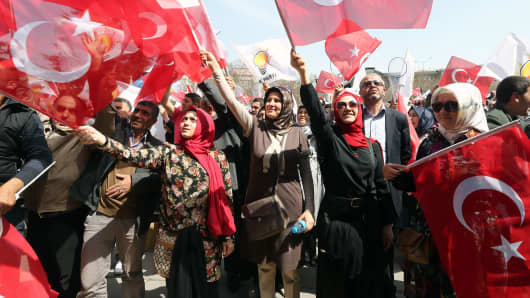Turkey's ruling party has its work cut out as the November 1 general elections rapidly approach. The likelihood that the Islamist Justice and Development Party (AKP) will be able to secure a slim majority at the ballot box is extremely low and, not withstanding electoral fraud, a hung parliament is widely expected. The winner-takes-all approach of President Recep Tayyip Erdogan, his abuse of power and intolerance of criticism has caught up with him and is taking its toll on the party over which he presides.
Playing the security card
The primary preoccupation of most Turks is violence and mounting insecurity, which is a double-edged sword for the AKP. Erdogan has toured the country urging voters to hand the AKP a majority so that he can put an end to political instability and terrorism. But it is the government's divisive domestic security and foreign policy — including its failure or limited appetite to effectively crack down on Daesh (Islamic State) over recent months — which has at least partly accounted for the increased bloodshed in Turkey.
The double suicide mass-casualty bombings against participants in a peace rally in Ankara on October 10 by Daesh have magnified allegations by the opposition of negligence, or in extreme cases, even government complicity. Attacks by Daesh and the extremist Marxist Revolutionary People's Liberation Party-Front, coupled with the Turkish army's ongoing military campaign against the Kurdistan Workers' Party, mark a worrying trend. Frequent attacks against the staff and premises of the political opposition are of no less concern. Turkey has not witnessed politically motivated attacks on this scale since the 1970s and 1990s.
The AKP meanwhile has to contend with other pressures, including a weak lira, an economy that is projected to expand by a relatively modest 3 percent of gross domestic product in 2015 and unemployment close to 10 percent. The cost of hosting over two million Syrian refugees represents another headache — though a pledge of 3 billion euros ($3.3 billion) of aid from the European Union as part of a broader agreement will certainly help alleviate the financial burden.
New elections expected in 2016
In light of these dynamics, Erdogan's efforts to boost support for the AKP are likely to be in vain. The results of a public opinion survey conducted by the much-respected Metropoll in September gave the AKP 41.4 percent of the national vote, up from 40.9 percent in the June ballots. Deprived of the 276 deputies required for a slim majority in the 550-seat Grand National Assembly, the AKP would be forced once again to enter coalition negotiations with the opposition.
While the prospect of a power-sharing deal with the political opposition remains unpalatable for Erdogan, he may consider temporarily shifting tack. By allowing Prime Minister Ahmet Davutoglu to form a governing coalition with the Kemalist social-democratic Republican People's Party (CHP), Erdogan may try to deflect allegations that he is throwing the country under the bus for his own personal ambitions and the survival of his graft-tainted family.
The CHP has not only pledged to jump-start peace talks with the PKK, but has also promised to engage in much-needed structural economic reforms to align national legislation with that of the European Union and to curtail Erdogan's involvement in day-to-day politics. Most investors have their fingers double-crossed for a CHP/AKP coalition.
Yet, the chances of a CHP/AKP coalition materialising or surviving are slim. It is far from clear that CHP Chairman Kemal Kilicdaroglu and the Prime Minister would be able to reach an agreement over the range of high-stake issues that divide the two parties. These range from the role of the president to education.
An easier fit for the AKP would be forming a coalition with the Nationalist Movement Party, though, like the CHP, the party's leader, Devlet Bahceli, is demanding an end to Erdogan's excesses.
However, such a coalition is likely to be even more short-lived than one with the CHP. The two parties are both center-right, nationalist (albeit to different degrees) and competing for the same voters. The AKP leadership may be tempted to brandish its nationalist credentials and engage in a game of one-upmanship by perpetuating the fight against the Kurdistan Workers' Party and increasing social and political polarisation in a bid to win more votes from the Nationalist Movement Party in new elections.
All this suggests that 2016 is likely to be at least as turbulent for Turkey as 2015. Even in the event that Erdogan is able to extend the rule of an interim AKP-dominated administration to a year, Turkey will be forced to once again return to the polls.
—Anthony Skinner is a director at risk consultancy Verisk Maplecroft.




